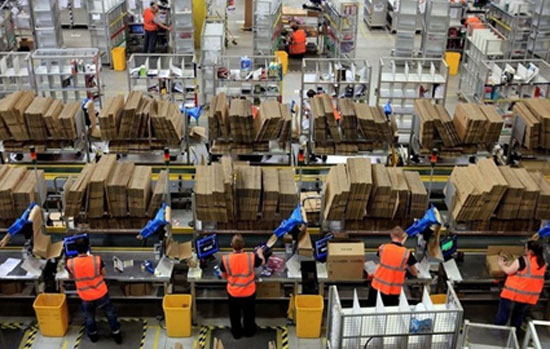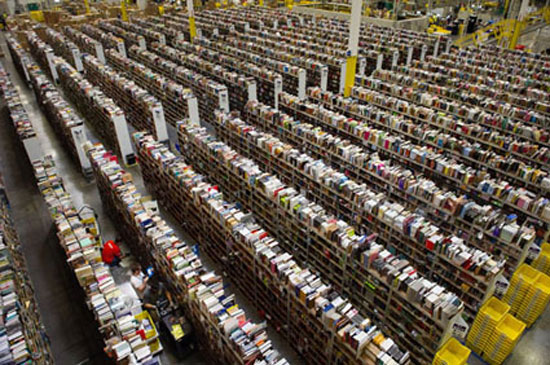(or searching for work models for the 4th industrial revolution)
A vast space, somewhat like a prison, with scattered security gates that monitor your movements as you enter and exit a building. During a shift that lasts over 10 hours, you will have to cover more than 20 kilometers, picking, sorting, loading, and unloading. All for the basic hourly wage. If you want to go to the toilet, you need to think carefully. Your absence from your workstation will be recorded as idle time, and there is a serious chance of reprimand. Or perhaps you might not manage to meet the day’s quota. To save some time, one solution is to quickly go to a corner and urinate into a soft drink bottle. For every complaint you make, you will be punished with a penalty point, and if you accumulate three points, they will “release” you (as if it’s some sadomasochistic power game). An absence due to illness is a serious reason to be punished with a point, even if you provide a doctor’s note. And every morning, when you arrive at this place of testimony, you will be greeted by a life-size cardboard character, with a cloud above him, like those in comics: “we love our job and when we’re not here, we miss it.” This is not some Potosi mine; although you load carts all day… Nor is it a gulag; although you must meet quotas… Nor is it a concentration camp; although the inscription at the entrance “welcomes” you with an Arbeit macht frei… It is a typical Amazon warehouse in the center of the developed world, in the UK. This is where electronic orders from Amazon’s websites arrive to be collected from the shelves, packed, and shipped.

In the same company, some programmers and managers may be paid hundreds of thousands of dollars a year, eat healthily in internal restaurants with menus prepared by some famous chef (of course there are also vegan dishes…), have their own gyms, game rooms and whatever else might keep them in a state of prolonged childhood (or perhaps we should say student life…); and some others must endure on a daily basis a wild and humiliating devaluation that borders on shameless labor. Is this perhaps a random coincidence? Amazon’s appetites do not stop at these labor camps. Even the slightest safety net that may still exist for workers in this category – although it hires many of them indirectly, through intermediary employment agencies (labor pimps, in simple terms) – seems to sit uncomfortably in its throat. Recently, it decided to apply its characteristic approaches to labor issues in the area of delivering its orders. And we are not referring to its plans for drone deliveries. Below we present excerpts from an article in The Atlantic: 1
“Amazon Flex [is] a program through which the e-commerce giant pays ordinary people $18 to $25 per hour (before expenses) to deliver packages with their own cars.
…
Welcome to the future of package delivery. As more and more people shop online, companies like Amazon are turning to independent external contractors – essentially anyone who owns a car – to deliver orders to homes and businesses. Flex has become essential for Amazon because it has such rapid growth rates that it can no longer rely on FedEx, UPS, and the postal service. Flex handles the “last mile” of orders, which is also the most complex part of the entire journey from their origin to your door. It also allows Amazon to cope with increased traffic during the holiday season…
…
But Flex operates throughout the year and not only during festive periods, which suggests there is another reason: low cost. It’s a discovery the freight trucking industry made in the last decade: using external contractors instead of unionized drivers saves money, since a large portion of the cost is borne by the drivers themselves and not the companies.
…
At first glance, this kind of job … seems like a good opportunity. However, Flex workers have no health insurance or pension, nor guaranteed shifts or working hours per week. They are not covered by basic protections, such as minimum wage and overtime pay, and are not entitled to unemployment benefits if for some reason they suddenly cannot work. And when they try to calculate their potential daily earnings, they often fail to take into account the expenses these jobs entail.
…
Amazon Flex workers sometimes earn less than the city’s minimum wage where they live… If a driver needs more time to deliver his orders compared to what Amazon has calculated, he is not paid for this extra time… If a driver is involved in an accident, it is he and not Amazon who must cover any medical and insurance expenses. If the driver receives a ticket, then he must pay it himself… Due to how Flex works [note: You are required to download an app on your mobile and there you receive notifications for available new orders with specific time requirements for their completion], drivers do not know when new time blocks will be available nor can they calculate how much they will earn in a day.
…
If this trend in the delivery sector continues toward non-unionized workers and external contractors, workers in this field may find themselves in a position where they could once support a family to one where they will earn less than minimum wage. The average salary of a long-haul driver is today $40,000 per year, when in 1980 it was equivalent to $100,000 in today’s dollars.” 2

We repeat the question: is it a coincidence when such “clean” high-tech companies engage in practices of worker exploitation? No, and Amazon is not an isolated example. It has become almost fashionable in recent years for companies to appear that pretend to be simple electronic platforms connecting users with each other, offering cheap alternatives to service provision. Lyft and Uber follow similar operational models in the transportation sector. You sign up on their platform and you can transport people with your own car. In Greece there were indeed unlucky ones; because they fell upon the taxi owners’ lobby and not from some disposition to protect drivers. The now famous AirBnb does exactly the same with short-term property rentals. Here of course the Greek entrepreneurial spirit found its health and the Greek petty bourgeois his ideal: to sit and the machine to cut a unit out of thin air – so far the volume of tourism (the heavy weapon of the Greek economy, which fact alone is cause for hearty laughter) seems to keep the peace between property owners and these hotel units, with the broken ones paying the price.
In any case and regardless of Greece, which is not in any case a typical case of a developed economy, the trend towards shedding as large a portion of labor costs as possible is evident. We have pointed this out in the past, however it is worth repeating: the tendency to compress costs to the point where almost phenomena of slavery emerge is organically connected to the tendency towards the extreme exploitation of labor and the enlargement of fixed capital in relation to variable capital, that is, the increase in the organic composition of capital through high technology. High-tech companies, precisely because of their high organic composition, should not “normally” display such monstrous profits, since they have reduced margins for extracting surplus value. However, they manage to do so; artificially expanding these margins by integrating into a circuit that also includes labor-intensive, “dirty,” and wildly undervalued sectors. In our view, the trend towards sharing economy models (as they have euphemistically and Orwellianly been called), such as Airbnb and Uber, perhaps also indicates a certain awkwardness. On one hand, the new technologies leading towards the 4th industrial revolution urgently demand space to develop. On the other hand, they have not yet fully found their footing regarding exactly how they will translate into the level of labor. No matter how “valuable” the efforts of the sharing economy are as a first step, they are to a significant degree subject to the good will of the participants. Amazon may have gone one step further in finding a way out. Through the vertical integration of both the “high” and the “dirty” parts of its production chain, it controls to a much greater extent and in a much more direct way how surplus value extraction will take place. And from this perspective, it indeed points towards the future…
Separatrix
- I delivered packages for Amazon and it was a nightmare ↩︎
- Incidentally, see also the movie Convoy (1978) by Sam Peckinpah. ↩︎
